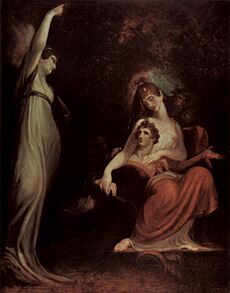Vice facts for kids
A vice is a bad habit or a negative part of someone's character. It is a behavior or practice that is often seen as wrong or harmful. For example, being very selfish or always telling lies could be considered vices.
Vices are the opposite of virtues. A virtue is a good quality, like honesty, kindness, or courage. While a vice can lead to negative outcomes, practicing virtues helps people live better and happier lives.
Contents
Where the Word Comes From
The word vice comes from the Latin language. It is from the word vitium, which meant a "flaw" or a "defect." This is also where we get the word vicious, which means something is full of vice, or very aggressive and harmful.
Vice in Society
Every society has rules and laws to help people live together safely and peacefully. Some laws are about actions called "vice crimes." These are activities that are thought to be harmful to people or the community. What is considered a vice crime can be different depending on the country and its culture. An example of a vice crime in many places is illegal gambling.
Vice Squads
To deal with these kinds of activities, some police departments have a special team called a vice squad or vice unit. The job of a vice squad is to enforce laws against harmful activities that are considered moral crimes.
In some countries, there are groups whose job is to encourage good behavior and discourage vice. For example, in Saudi Arabia, there is a group called the Committee for the Promotion of Virtue and the Prevention of Vice.
Views on Vice in Religion
Many religions around the world teach about the difference between vice and virtue. They offer guidance on how to avoid bad habits and develop good ones. These teachings often see vice as something that harms a person's spirit and their relationship with others and with God.
Christianity
In Christianity, a vice is seen as a habit of doing wrong. This is different from a sin, which is a single wrong act. Christians believe that developing vices can harm a person's connection with God. To overcome a vice, a person needs to practice the opposite virtue over and over again. For example, to overcome the vice of dishonesty, one must practice being truthful.
The Seven Deadly Vices
A famous list in Christian tradition is the Seven Deadly Vices, also known as the Seven Deadly Sins. These were described in detail by the poet Dante Alighieri in his famous work, the Divine Comedy. They are seen as the root of many other problems.
- Pride: This is thinking you are more important than everyone else. It's an excessive love for yourself that can make you look down on others.
- Envy: This is feeling bitter or resentful because someone else has something you want, like success, talent, or possessions.
- Wrath: This is extreme anger, often leading to a desire for revenge. It's anger that goes beyond a sense of justice and becomes hateful.
- Sloth: This means being lazy to the point where you waste your time and talents. It's not just about resting; it's about avoiding your responsibilities.
- Greed: This is an intense desire for more money, power, or things than you need. A greedy person is never satisfied with what they have.
- Gluttony: This is the habit of consuming too much food or drink. It's about overindulgence and seeking pleasure from eating in an excessive way.
- Lust: This is an unhealthy and excessive focus on physical attraction. It gets in the way of forming respectful and loving relationships with others.
Buddhism
In Buddhism, vices are called "defilements." They are seen as negative states of mind that cause suffering. The goal for Buddhists is to cleanse the mind of these defilements to achieve enlightenment and inner peace. Some of the main vices that Buddhism warns against are greed, hatred, and ignorance. Other negative habits include jealousy, anger, and laziness.
Judaism
Jewish ethics also place a strong importance on avoiding vice. Jewish teachings, especially in writings known as musar literature, encourage people to work on their character traits, overcome bad habits, and live a virtuous life.
Islam
In Islam, the holy book, the Qur'an, and other religious texts give guidance on what is right and wrong. They forbid many acts that are considered vices. Islamic scholars have described several vices to avoid, such as anger, envy, and slander (saying bad things about others).
A Philosophical View
It's not just religions that talk about vice. Some philosophies do too. For example, Epicureanism was a school of philosophy in ancient Greece. It taught that the way to a happy and peaceful life was to seek simple pleasures and avoid things that cause pain or anxiety. Epicureans believed that by thinking rationally and understanding nature, people could overcome vices and live a virtuous life.
Images for kids
See also
 In Spanish: Vicio para niños
In Spanish: Vicio para niños
 | William M. Jackson |
 | Juan E. Gilbert |
 | Neil deGrasse Tyson |





